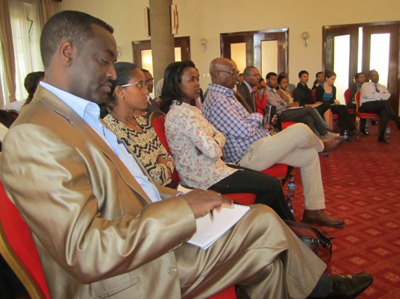Family Medicine Ethiopia Highlights
Ethiopia’s first postgraduate Family Medicine Program was inaugurated in February 2013 and recently celebrated its second anniversary with a number of important activities. Once the final exams for the residents completing the first and second years of their program were concluded, attention turned to welcoming nine new residents, the largest cohort so far. This brings the total number of Family Medicine residents to 21. Orientation was a two-week program that included training programs in ALSO (Advanced Life Support in Obstetrics) and quality Improvement by faculty from the Department of Family and Community Medicine, University of Toronto, and presentations on a variety of Family Medicine topics by faculty from Addis Ababa University, University of Toronto and University of Wisconsin.
Local and visiting faculty also took the opportunity of doing an interim assessment of the new program. They compared the progress of the program against the
WONCA Standards for Postgraduate Family Medicine Education and against the program’s own Strategic Plan which was developed when the program was inaugurated. Everyone was generally pleased with the progress of the program to date, and the process allowed everyone to identify gaps and challenges and formulate plans to address them.

The program also held its second annual Family Medicine meeting (pictured at left) at the Ghion Hotel, with funding provided by MEPI. The morning theme was the unique role for Family Medicine in the Ethiopian health care system and the afternoon theme was the development of a roadmap for establishing Family Medicine in Ethiopia. Local and guest university faculty attended as well as officials from the Federal Ministry of Health and the Addis Ababa Regional Health Bureau.
The Federal Ministry of Health (FMOH) is enthusiastically embracing Family Medicine for its health care system. It has decided to establish two more Family Medicine programs at Gondar and Jimma Universities in September, hence its request for a roadmap at the annual meeting. It has previously declared that graduates of the three-year Family Medicine programs will be considered and paid as specialists. The commitment of the FMOH will include a clear description of the role of the family physician in the Ethiopian health care system which will help with recruitment.
Two of the original faculty in the Family Medicine program will be leaving this year. Dr Dawit Wondimagegn, inaugural head of the program and Associate Dean for Graduate Studies of the College of Health Sciences, Addis Ababa University will be leaving on sabbatical in September. Dr Brian Cornelson of the University of Toronto and Addis Ababa University will be leaving the end of April in the third year of his appointment to return to Canada.
The Department of Family Medicine, University of Toronto will continue to support the program through the university’s TAAAC (Toronto Addis Ababa Academic Collaboration) program, and short-term faculty from the University of Toronto and University of Wisconsin will assume day-to-day duties in anticipation of greater Ethiopian faculty involvement once the first group of residents graduates in February 2016.
All in all the Family Medicine program at Addis Ababa University has managed to grow and thrive through the growing pains that all new programs inevitably endure. An oft-quoted Ethiopian proverb is that ‘Slowly slowly the egg will (hatch and) walk.’ This egg is now walking!
Dr Dawit Wondimagegn
Dr Brian Cornelson